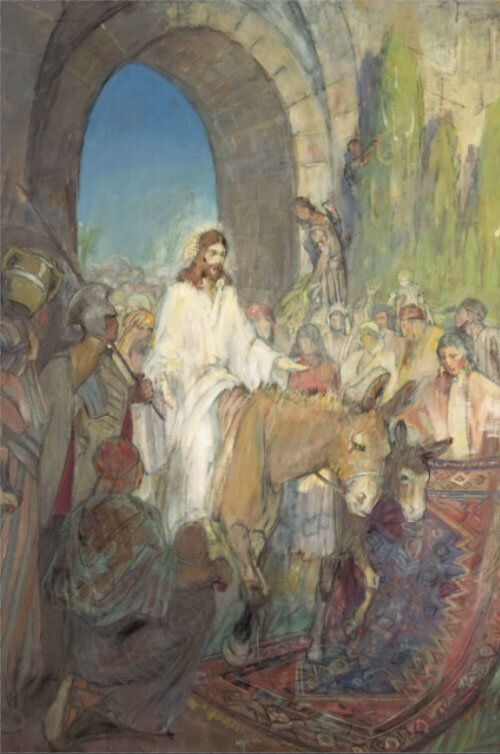
Then the multitudes who went before and those who followed cried out, saying: “Hosanna to the Son of David!”
“But You are holy, Enthroned in the praises of Israel.” These words beautifully fit the image we get from the above passage. The multitudes are before and after Jesus, as if carrying Him along with their praises – He’s truly “enthroned” in their praises, especially given what they’re saying, confessing Him to be the Son of David, the messianic King.
“But you are holy, Enthroned in the praises of Israel.” What a line to summarize the Sanctus, which is the canticle of praise sung just prior to the Lord’s mystical coming to us today, in Holy Communion. “But you are holy.” We might as well say, “Holy, Holy, Holy.” “Enthroned in the praises of Israel.” Based on the Palm Sunday event in which we see Jesus carried along in a “throne” of praises exclaimed by those before and following Him, we might assume what exact praises enthroned Him: “Hosanna; blessed is He who comes in the name of the Lord.”
Together we get the Sanctus. Singing the Sanctus just before communion truly embraces us in that eternal moment.
Here’s what’s really cool. That verse, “You are enthroned in the praises of Israel” is a great “worship” verse, giving a beautiful visual as we sing our praises. But consider the two verses preceding this famous verse:
“My God, My God, why have You forsaken Me? Why are You so far from helping Me, And from the words of My groaning? O My God, I cry in the daytime, but You do not hear; And in the night season, and am not silent.”
Yup, it’s that verse. The opening verses of that powerful crucifixion Psalm, Psalm 22. The “You are enthroned” verse is the third verse of that famous chapter. What a commentary on the basis for us being able to carry our Lord along in our praises, in which He comes to us in flesh and blood to save us in our sins. He became abandoned from God so we can have that. That’s what’s going on with the “but” that begins the “you are enthroned” verse. This gist is, “I [Jesus] am abandoned by my God, but God is enthroned and near to His people, even in their praises.”
Of course, the same Lord who is the abandoned One is also the One enthroned in the praises of Israel. This adds some dimension to the “enthroned one.” He who is enthroned is abandoned. That is, as we meditated on a few days back, just as the donkey – whose colt was redeemed by the death of a lamb – bears the Lamb of God, so do we bear the crucified One. We take up the cross. We bear our Lord, the abandoned one, in the throne of our praises. Are we thinking such things as we offer our praises – we’re proclaiming our dying to this world in Him!
Did Israel know who they were enthroning in their praises as they cried out “hosanna”? Did they know what went into their “hosanna”? “Please save us” could only happen through the shedding of blood, of their Son of David.
This is something our hymns recognize, particularly the Palm Sunday hymn “Ride on Ride on in Majesty”:
Ride on, ride on in majesty!
In lowly pomp ride on to die:
O Christ, your triumphs now begin
o’er captive death and conquered sin.
Ride on, ride on in majesty!
The winged squadrons of the sky
look down with sad and wond’ring eyes
to see th’approaching sacrifice.
Ride on, ride on in majesty!
Your last and fiercest strife is nigh;
the Father on his sapphire throne
expects his own anointed Son.
Ride on, ride on in majesty!
In lowly pomp ride on to die;
bow your meek head to mortal pain,
then take, O God, your pow’r and reign.
Yes, ride on in majesty. But what does this majesty mean. “In lowly pomp ride on to die.” The angels look down in sadness at “th’approaching sacrifice.” Christ’s “last and fierest strive is nigh.” “Bow your meek head to mortal pain.”
Christ’s triumph occurs in the midst of His humblest moment. Never underestimate the extent to which this is true for your own life as well. This is always how our Lord operates in the Scriptures, working victory in the midst of defeat. Why? So we always know it is He Who is the source of our life and existence and salvation.